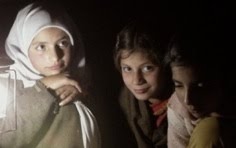 It is a great lesson in Personal Growth to examine those stories that enchanted us, that had a hold on us as children.
It is a great lesson in Personal Growth to examine those stories that enchanted us, that had a hold on us as children.A careful study can reveal a pattern or ‘storyline’ that occurs in our lives. It is important to remember that the same story can have a completely different significance for different people, or for the same person at different parts of her or his life. Knowledge of this is itself a major step in understanding the moves and choices we make as adults.
Understanding a pattern becomes the first step in participating in the re-writing of our own story. As story-keeper Jonathan Young has so perceptively put it: “We may not be able to create the rivers that carry us along, but we can certainly navigate the little boats of our lives.”
There is much controversy about whether the elements in these stories, particularly fairy tale ‘horror’, is ‘good’ for children. Some experts declare that there is no intrinsic value in exposing children under six to death or horror or fright; others argue that all children have rich fantasy lives, filled with fears and anxieties. They struggle to cope with what they do not understand, or what they feel powerless against – mostly the world of adult expectations and adult meanings.
I asked several Tellers who work with children to tell me of their experiences.
Children who listen to or read stories are encouraged to imagine the consequences of an action; most stories contain the making a choice - or even an unforeseen event that requires choices. A story-worker who works extensively with young children claims that “the ability to imagine outcomes is not a frivolous pass time, but an essential skill that can contribute to a child's safety.”
Young people can identify with stories of perseverance in the face of obstacles and difficulties – “If he/she did that, so can I.” Or even “Oh – so there’s another way to approach this! Well….”
Listening to a story encourages visualization; the mind can make its own pictures, which can be a powerful learning tool, even for subjects like science and maths. Exercising the imagination grows mind muscle for new and inventive ideas.
A story touches emotions and deeply stirs memory. By making space for this as they grow up, children are taught – even if indirectly - to validate and even honor this aspect of their lives, that most learning seems to ignore at best, and marginalize or punish at worst.
While it may not be so possible to be considered a ‘hero’ in everyday life, when children talk of the stories that enchant them, there is a strong identification with the actions, the achievements, the popularity of a character or many characters – and sometimes the ‘connection’ happens in ways that surprise us.
Looking back at those stories that enchanted us, particularly as young children, we can see that the adventures in the stories often reflected the challenges we faced at that particular point of our lives.
At another level, a learning interpretation may be this: all characters represent various aspects of myself.
When the inhabitants of Hamelin refused to pay the Pied Piper what they had promised for leading away the destructive rats by using the tune of his pipe, he led their children away with his magical music. So - the children are the playful side of myself, attracted to magic, but not given to much analysis of the outcome; the village leaders could symbolize a practical, thrifty side that doesn’t respect or value magical qualities or artistic abilities. If I short-change my playful, imaginative, creative side, and give in too much to the ‘practical’, I may end up paying a heavy price for this neglect.
Looking back at our stories and reflecting on them can sometimes help us understand meanings, or more importantly – recognize and shift those meanings for a more fulfilling life.
May finding your Story-patterns teach you to move on in wholeness.
Marguerite Theophil
(See “Healing Re-tellings”)
More alive
When we tell and listen to stories, we can almost feel our souls breathing fully and deeply.
Our capacity to see options, to visualize possibilities, to imagine
expands and we are somehow more alive.
~ Michael Parent
